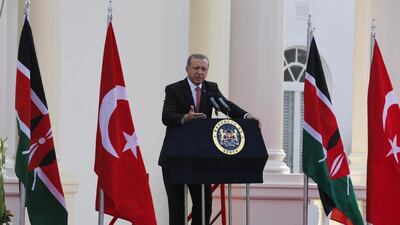When Turkey’s formidable soft power was taking shape in the late 2000s, Africa was a natural market for influence. Nearly a decade of strong economic growth under the AKP’s platform of neo-liberalism resulted in the global emergence of the country’s construction sector and the expansion of Turkish legacy brands such as the national airline. The combination of the two, along with Turkey’s emerging diplomatic clout, helped propel Africa-focused foreign policy in Ankara. There is another wrinkle to Turkey’s outsize interest in Africa, and it was clearly on display last week.
Turkish president Recep Tayyip Erdogan has just concluded his 10th official trip to sub-Saharan Africa with a visit to Uganda and Kenya. Given the infrastructure needs of these countries, Turkish construction companies have been busy over the last decade taking market share from the Chinese in East Africa.
Writing for Al Jazeera last week, Mr Erdogan said the trip was to promote “closer cooperation with regional allies, develop solutions to shared challenges and explore mutually beneficial opportunities”. The Turkish leader also noted that Turkey’s trade with sub-Saharan Africa has grown “eight-fold to reach $6 billion” since 2000. Fast growing markets such as South Africa and Kenya have been fertile for Turkish exporters selling everything from cheap hairdryers to microwaves.
The emergence of Turkish influence in Africa is most evident in the dramatic growth of Turkish Airlines on the continent. Destinations in Africa have jumped from 13 in 2009 to 51 in 2016, including often-ignored countries like Zambia and Benin. Istanbul has become an African aviation hub because of Turkish Airlines investment in the continent.
Since 2009, Turkey has also expanded its diplomatic influence with the opening of 25 new embassies. Underpinning this growth is a network of schools operated by Mr Erdogan’s ally-turned-arch-rival Fethullah Gulen.
Before the trip, the Turkish government designated the Hizmet (Turkish for service) organisation run by Mr Gulen as a terrorist organisation. Mr Gulen, an Islamic preacher who has lived in self-imposed exile in the United States for two decades, operates a global network of Islamic schools, preparatory institutions, think tanks and media outlets.
He is estimated to have millions of followers from Kenya to former Soviet Union countries like Kazakhstan. In Turkey, many of Mr Gulen’s followers have graduated from his schools into the ranks of the police force, judiciary and media. Providing education has allowed the Gulenists to establish influence across the world.
In 2013, Gulenist loyalists in the Turkish police released several wiretap recordings purporting to reveal widespread corruption among Mr Erdogan’s close confidants, including the president’s own son.
Since then, the Turkish government has launched an all-out assault on the Gulen movement inside Turkey by firing thousands of police officers, shutting down media outlets and declaring the organisation a terrorist “parallel state” keen to overthrow the Turkish government. Having thoroughly flushed out Gulen in Turkey for the moment, Mr Erdogan has set his sights on Gulenist operations in Africa.
Ironically, Gulenist schools in Sub-Saharan Africa – numbering close to 100 – were a critical component for the development of Turkish soft power in Africa. Many of the sons and daughters of political elites in countries like Kenya have been educated in Gulenist schools.
Back when Mr Gulen and Mr Erdogan were on good terms, the school network was seen as a critical driver of Turkish interests and way of establishing deep roots in society. Now, the schools are a liability. One aide travelling with Mr Erdogan in Africa told the Financial Times that the Gulenists were “running a parallel structure [in Africa], pretending to represent the Turkish government”.
Mr Erdogan’s mission to undermine Mr Gulen’s reputation in Africa demonstrates how well his political model for Turkey’s growth used to function and how it has broken down. Over the first decade of its existence, Mr Erdogan’s AKP solidified power not by outlawing political rivals but by co-opting them and growing Turkey’s economy. Through a partnership with Mr Gulen’s Hizmet organisation, Turkish prestige was spread successfully throughout Africa and other key areas such as central Asia.
Since the 2013 anti-government protests that began in Istanbul’s Gezi Park, Mr Erdogan has attempted to solidify his own power by removing every political challenger. Having defanged the military years before Gezi Park with the Ergenekon trials, the president turned his sights on leftists. He then attacked former allies like Mr Gulen and renewed hostilities with the Kurds.
At the same time, he secured the presidency with the intention of rewriting the constitution in a manner that would entrench his limitless power. Even former prime minister Ahmet Davutoglu was labelled a potential adversary and recently pushed from office. This behaviour boils down to simple Machiavellian statecraft but Mr Erdogan appears to forget that alliance building helped him consolidate power in the first place.
The president still needs allies to ensure positive economic and diplomatic results that will keep the Turkish electorate largely at bay. Arguably, he needs allies now more than ever. While Turkey continues to expand its soft power in Africa, its European Union membership bid is anything but warm. Likewise, Turkey’s economic prospects at present are a far cry from the halcyon days of the late 2000s. Even the country’s famed “no problems with neighbours” foreign policy is in complete tatters.
As soon as Mr Erdogan turned his sights explicitly on attaining his own power, many of the positive developments in Turkey’s economic and diplomatic arsenal took a turn for the worse.
Now the president is forced to fight the exact organisation that helped him woo Africa while he’s on an African tour. This should generate some soul-searching as his political future is only at risk because of his own decision-making.
jdana@thenational.ae
On Twitter: @ibnezra

